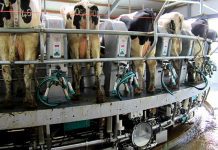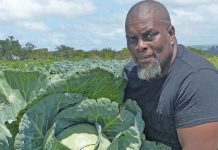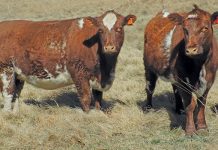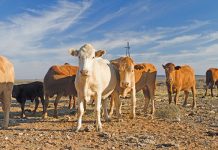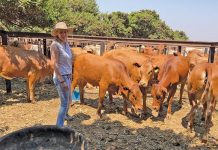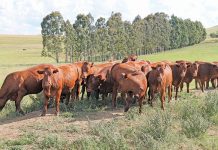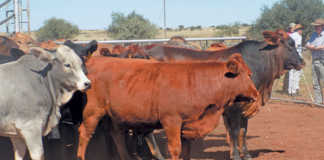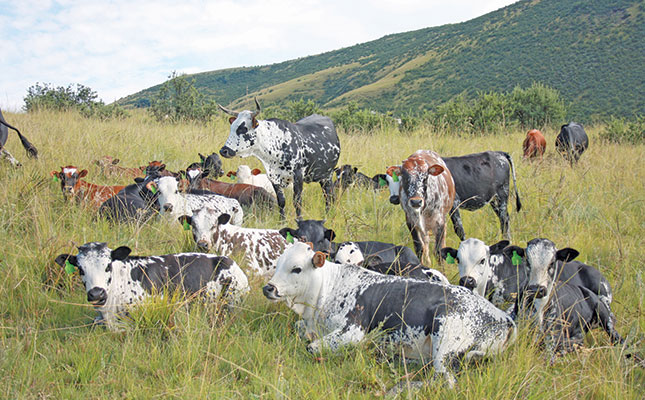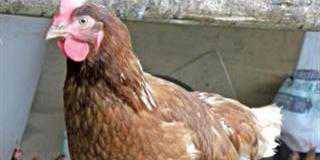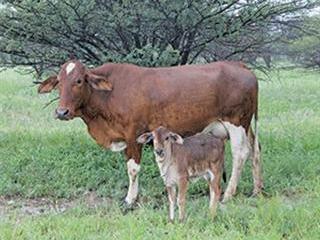
Mike Ramagofu is a smallholder cattle farmer from Fafung, a village adjoining the Borakalalo Nature Reserve in North West.
Fafung village is bisected by the Toloane River, its primary water source. Here, for generations, villagers have depended on subsistence or semi-commercial farming for their livelihood. “My family was no different,” recalls Mike, who currently runs about 40 Brahman cows. “My parents had cattle and used them to plough the lands.”
Although much has changed, many people still depend on livestock for an income. Crops are no longer planted and what used to be productive lands are now bush-encroached and used for grazing. After matriculating at the Kwena ya Madiba High School, Mike enrolled for a degree in animal health at North-West University but dropped out in his second year (2003), because of financial pressure.
He started a successful tuck shop business at the university selling fast food and groceries, which kept him busy. Testimony to the fact that you can only keep a farmer down for so long, Mike decided that somehow he would farm, no matter what. There was no land available nearby and he need to keep running his business to support the farming, which presented a challenge. “I wanted to come home, but could not leave the business as it was my only source of income,” he recalls.

Mike Ramagofu farms near the Borakalalo Nature Reserve about 60km north of Brits in the North West province.
Flexible farming
In 2006 Mike decided to become a part-time farmer. He had inherited about 13 cattle from his parents but did not like the type and quality of the animals. “I sold those that didn’t look good and started buying mostly Afrikaner-type animals,” he says. “I had a plan to cross them with Brahman.” With the money saved from his business, he bought several Brahman-type cows, choosing this breed because of the benefits he felt it offered his farming operation.
“I run my cattle on communal land, and Brahman have some definite advantages over other breeds in this situation. The Brahman is also suited to our climate, where temperatures rise to over 35°C in summer. After heavy rain, ticks become a problem, but because of the Brahman’s good parasite resistance, I don’t have a problem with tick-borne diseases.”
Brahman on communal land
There are certain challenges to farming on communal land that Brahman overcome more easily than other cattle, says Mike. “They require less veterinary care because of their hardiness, which makes them light on my pocket. Then, when grazing is scarce, other breeds lose condition faster than the Brahman does. Even though I’m not around all the time, I can manage the herd with the help of my stockman.”
Mike has built a kraal to house the cattle when they are brought into the homestead area. Most of the time they are in fenced grazing lands but do need to be brought in from time to time. “In summer, they come in after a week’s grazing, for about three days and in winter they come in for about five days.” Cattle are checked daily by the herdsman who watches out for signs of disease and parasite infestations. Mike uses Deadline to control ticks and vaccinates against heartwater, anthrax and foot-and-mouth. Cattle are periodically dehorned, castrated and branded.
“Although I did not finish university, I have some knowledge about cattle diseases and their treatment,” he explains. Mike says that the Brahman has a reputation for having a difficult temperament, which can be a management drawback. “But for me this is a good thing. The temperament makes them difficult to steal. Because of their good mothering qualities, cows are fiercely protective of their calves.”
In a communal area it is not easy to control mating or select specific bulls for specific cows. But Mike has discovered that bulls in his area find it difficult to mate with his Brahman cows. “The height of Brahman cows makes it difficult for shorter bulls to cover them,” he explains.
Breeding system
Because of the management difficulties on communal land, Mike doesn’t buy bulls for his herd. “In communally farmed areas, many cattle owners rely on the bulls of others. “Good bulls are expensive and you run the risk of your bull losing his fertility. There are irresponsible owners who do not protect animals against sexually transmitted and other diseases. This makes it risky to buy a bull and let it run with other cattle.” To solve this problem, Mike rents bulls from commercial farmers to serve his cows.

Mike has built handling facilities and a kraal near his homestead so that cattle can be brought in for routine procedures and mating.
After the calves are weaned, he puts the cows in a kraal with a leased bull for three weeks. “Because cows cycle roughly every 21 days, we keep them with the bull for three weeks,” explains Mike. “Brahman cows can perform and breed in extreme conditions. Even when grazing is poor, cows remain fertile. As the calves are small, there are no calving problems.” Because weaned calves continue to run with their dams, nose rings are fitted on calves between seven and eight months to wean them. “This also reduces stress for the calves,” he adds.
Planning a future
Although Mike is maintaining his operation on communal land, he explains that it is not an ideal situation for him. Herd expansion is limited for many reasons. When there is little rain, grazing is in short supply and feeding out of the bag is expensive. Mike sells his cattle to butcheries in Brits, and in Koster near Rustenburg and wants to get more value out of his animals by cross-breeding for a better carcass weight.
“The butcheries buy animals from me, and I transport cattle to the Brits abattoir with my bakkie and a trailer. Buyers collect the carcasses from the abattoir.” Mike markets his cattle from about a year onwards. “I round them off in a feedlot for two to three months with feed I buy from Tau Pride,” explains Mike. Because improvement through breeding is difficult, if not impossible, on communal land, Mike is looking for a farm to lease. This would be a significant step towards realising his vision of becoming a commercial cattle farmer.
“I am going to find a farm and focus on my cattle full-time,” he says.
Contact Mike Ramagofu on 078 627 2860.

